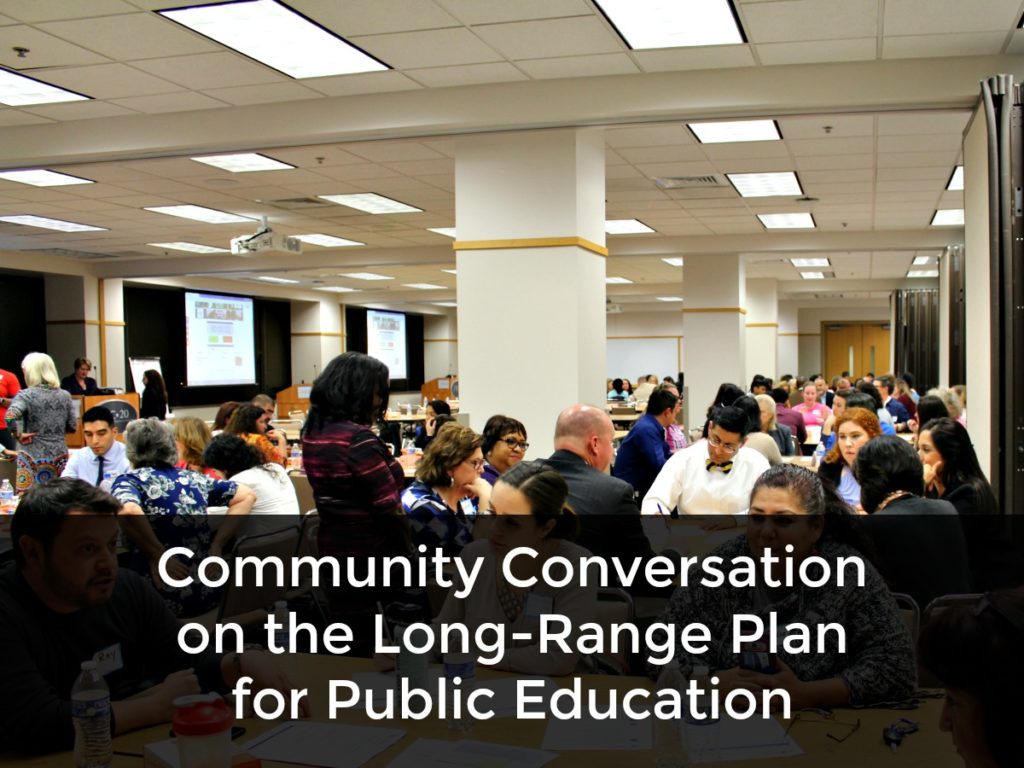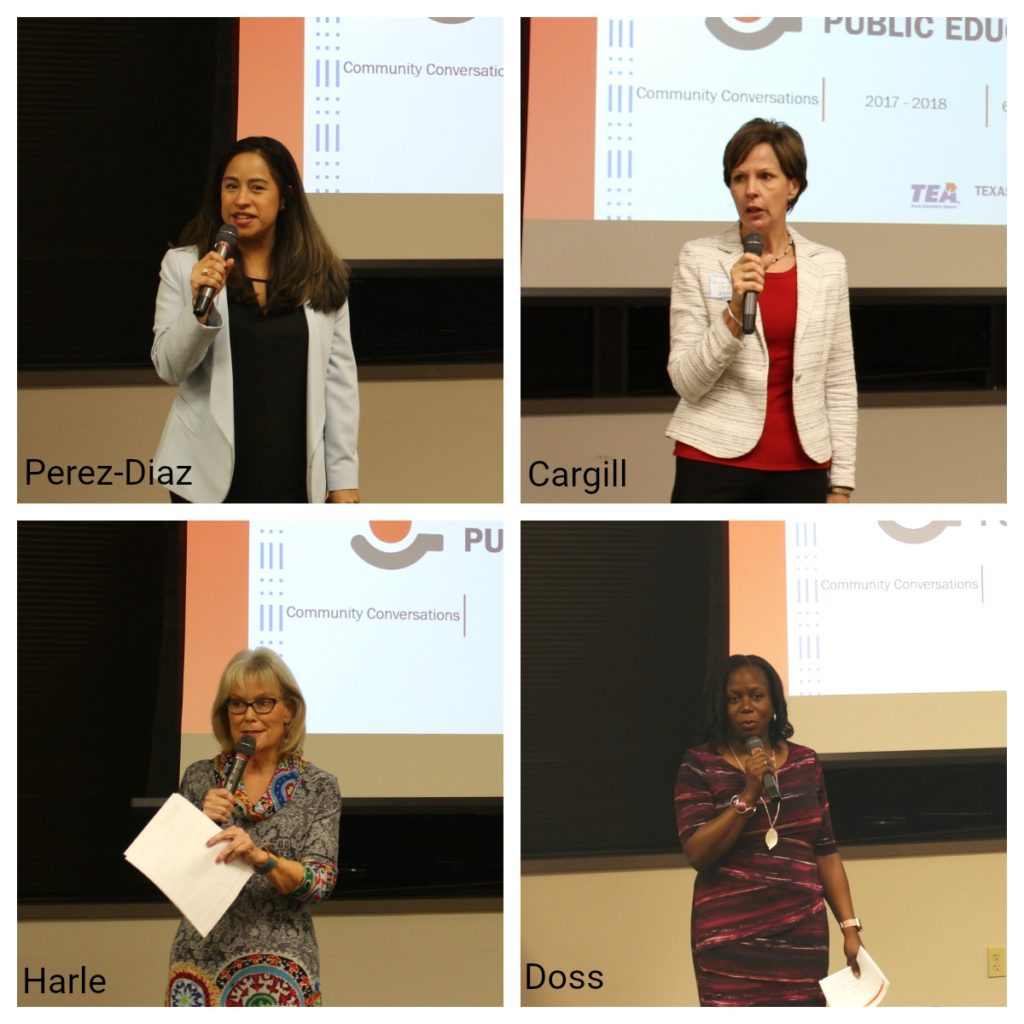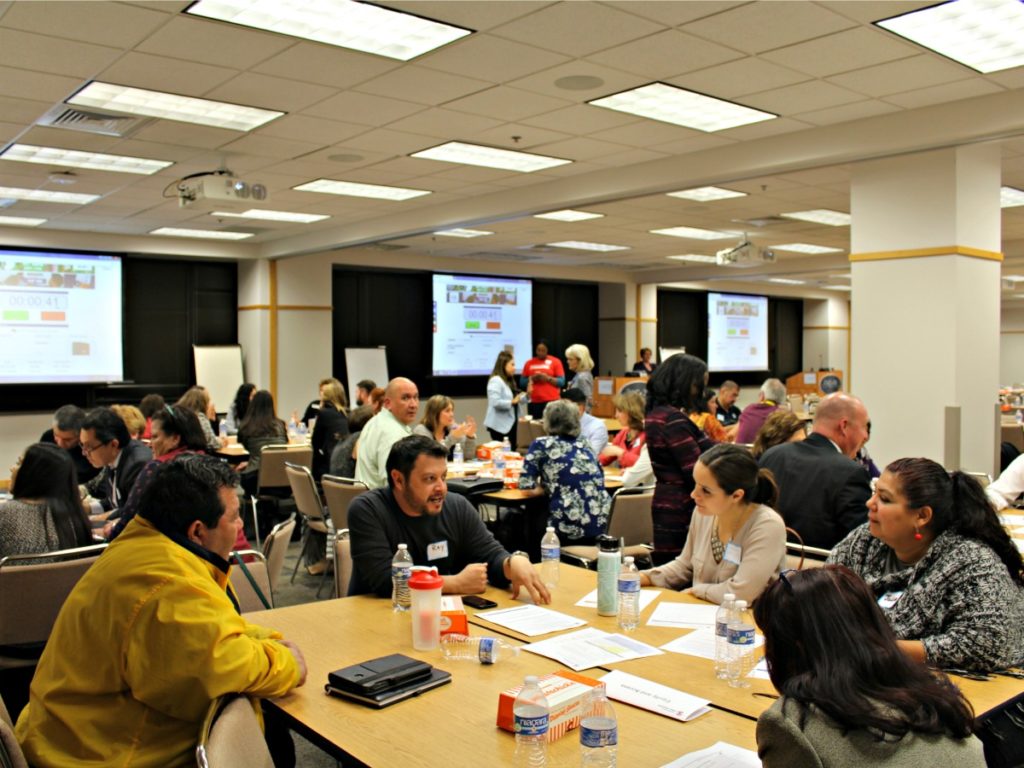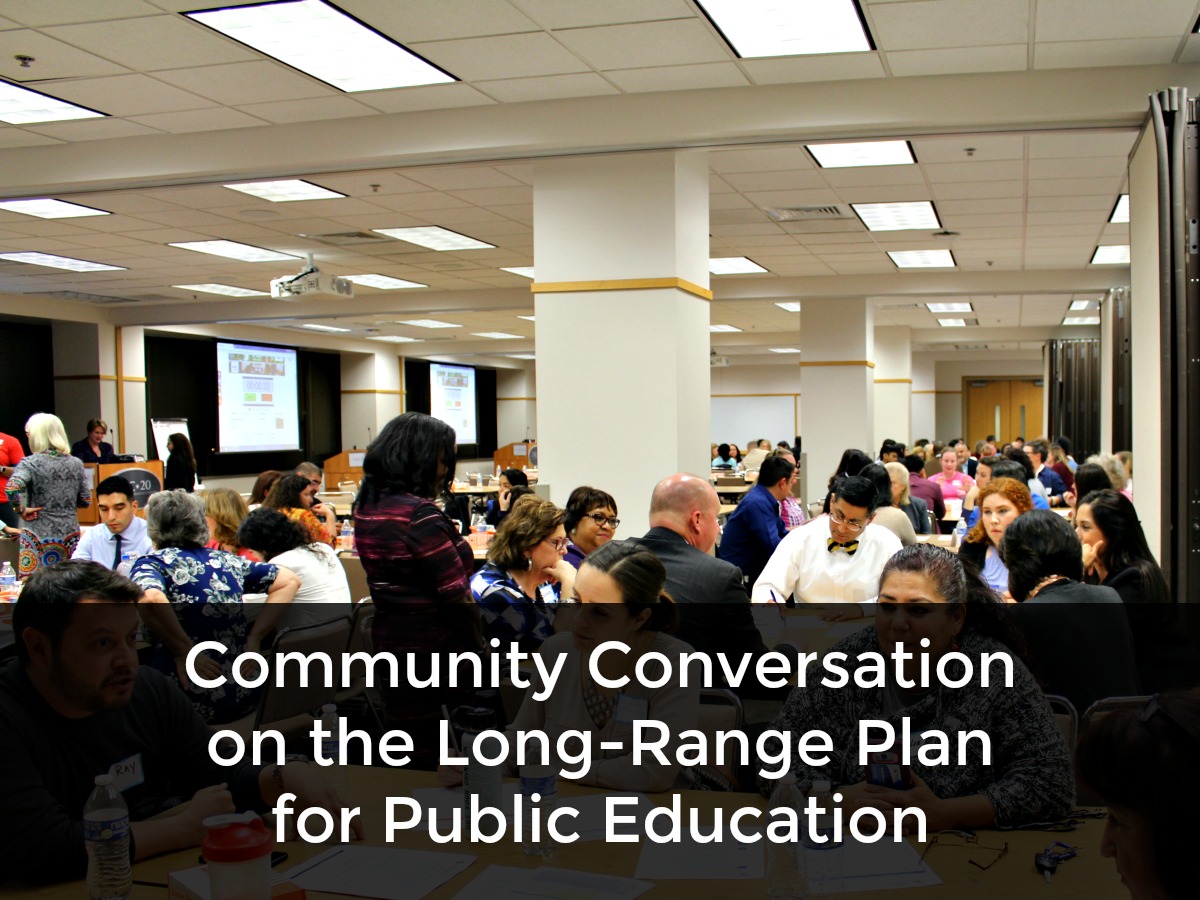
The Texas State Board of Education invited members of the San Antonio community to attend a Community Conversation on the Long-Range Plan for Texas Public Education. This event was one of a series of meetings in regions across Texas to get input from parents, students, educators, community members, and business leaders about preparing for the future of public education. I attended the meeting and want to share my experience and also my friends’ impressions. This post will also give you information about the context of the meeting and what to expect from the Long-Range Plan.
The San Antonio meeting happened on a Monday evening at Education Service Center Region 20. Marisa B. Perez-Diaz, SBOE Member District 3, opened the meeting and recognized several trustees and administrators from traditional public schools, including Brian Woods, Superintendent of Northside ISD; Carol Harle and Katie N. Reed, trustees at Northside ISD; Sandy Hughey and Joseph Trevino, trustees at North East ISD. (More information about school boards in this earlier post.)
Perez-Diaz noted that the previous Long-Range Plan was developed in 2006. “The TEA put it out, but then it sits on the shelf and collects dust.” This time, the SBOE wants to involve stakeholders in developing the plan. The 18-member steering committee meets in Austin, but the Community Conversations are happening all over Texas.
The committee is developing the Long-Range Plan with a target date of 2030 to synchronize with the Texas Higher Education Coordinating Board‘s 60x30TX plan. That initiative’s first goal is that, by 2030, at least 60 percent of Texans aged 25–34 will have a certificate or degree. (The current figure varies by region from about 30 to 45 percent, and San Antonio is in one of the least-educated regions.) More details about 60x30TX are available in a report, Prosperity Requires Being Bold (November 2016).
That report and more are summarized in An Assessment of State Plans, Reports, and Data (August 2017), a briefing document prepared for the steering committee by the Texas Comprehensive Center (TXCC) at AIR. TXCC has also been facilitating the Community Conversation meetings. At the San Antonio meeting, their staff presented questions for attendees to discuss and collected their feedback on forms for the committee to study.

Perez-Diaz introduced Barbara Cargill, SBOE Member District 8 and chair of the steering committee. Cargill noted that San Antonio’s Community Conversation had the largest turnout of any meeting so far. The meetings will continue through the spring, and the committee plans to present its report in the fall. “We want to make this plan accessible to the legislature. Our hope is to see some legislation that will help carry out these goals,” Cargill said.
Another steering committee member, Sheri Doss, is President-Elect of Texas PTA and lives in North East ISD. Doss proclaimed that her role on the steering committee is “holding up the banner for parents.” Among the briefing materials, Doss highlighted these two documents: A Sampling of Long-Range Plans From Other States and Education and Texas Demographic Characteristics and Trends. A third steering committee member, Harle (a Northside ISD trustee), agreed that the report from the Texas State Demographer opened her eyes, especially the statistic that 62 percent of Texas students are living in poverty.
The facilitators structured the discussion into two phases. First, each table had a round-robin discussion of the purpose of public education. Our group shared thoughts about preparing students to be good citizens and to be ready for college or career. I served as the scribe for my table, and the facilitators picked up our notes at the end of the exercise.

For the second phase, attendees shuffled to different tables marked with tent cards representing four topics:
- Student Engagement and Empowerment
- Educator Preparation, Recruitment, and Retention
- Equity and Access
- Family Engagement and Empowerment
I moved to a table marked for discussion of family engagement and empowerment. NEISD Trustee Trevino was at our table and shared a success story about the community garden at Colonial Hills Elementary. That story sparked more questions: What attracts families to get involved in a community garden program? What are the obstacles that prevent some parents from participating? Attendees praised teachers and school leaders who go off campus to get to know their communities. Also, some parents bubbled with anger at the impact of standardized testing.
I also visited a group that discussed equity and access. Several attendees expressed frustration at the school finance system and differences in access to technology. Also, they debated which groups were experiencing the greatest disadvantage: children with special needs, gifted children, or children with typical abilities. Several attendees praised dual-credit high school programs, but hoped for more widespread access across campuses.
After the meeting, I checked in with my friends who also attended the meeting to get their reactions. Their responses covered themes of collaboration, concern, and hope.
There is a need for partnership and dialogue among charter schools and traditional public schools. Ray Tijerina, who works on community engagement for Compass Rose Academy, commented: “To be sitting down with educational partners from ISDs and charter schools was refreshing and exciting. It makes you realize that we all have one common goal, the future our students. It also makes you realize that we all have the same problems. We need more of that in San Antonio, more cross collaboration where we’re coming together to identify issues and to find solutions to those issues.”
Charter school parent Abigail Kuiper, at a discussion of equity and access, found herself in a debate about charter schools versus traditional public schools. Kuiper said, “I did my best to state my case from the point of view of a parent who cares about education for my children and tried to do so respectfully. It ended with another attendee walking up to me and thanking me for my perspective. I thanked her for hers and said that I greatly value and appreciate these conversation because where else are we going to have them? It is my opinion that we have lost the art of disagreement.”
Ambika Dani, founder of Promesa Academy, also participated in a discussion about equity and access. “A Northside ISD parent in our group spoke about a conversation she had with a Southwest ISD parent wherein she described collecting money that would be used to buy their students T-shirts for when they took the STAAR exams to reduce the pressure of taking a test, whereas the Southwest ISD parent was collecting money to ensure that her school had enough copy paper for students to have access to the essential materials they needed. Stories like this continue to remind us of the grave inequity that exists in our public education system and the work that needs to be done to rectify this.” Public school parent Heather Eichling also expressed concern about equity and representation: “I was impressed by the turnout but have hopes for even more diversity in representation of all districts at these sorts of events.”
Tijerina and Dani both participated in discussions about educator preparation, recruitment, and retention. Tijerina said, “I loved the teacher recruitment piece. Our students need quality people in the classroom and we need to find innovative ways to recruit them, and retain them.” Dani commented, “Our group focused primarily on preparation as we believe it to be one of the most pressing issues. We talked about the various certification programs and alternate pathways that educators can take to becoming certified, and the need to ensure that these programs are all of a similar high-quality. We recognized that there are many strong educator preparation programs, such as our own Trinity University, however there is much work to be done to ensure that the individuals we are putting in front of our students are truly qualified to teach them.”
Kuiper noted that the educators at her table expressed frustration with the challenges they face in public education today, and had trouble identifying opportunities. “These educators communicated exasperation over lack of funding, over curriculum problems, over legislation, over STAAR testing pressures, etc.,” said Kuiper. However, some educators, including Michelle Janyzek, a professor at Texas A&M University San Antonio, recognize that “more money is not always the solution,” observed charter school parent Adanary Galindo, who was part of a conversation with Dr. Janyzek.
The attendees expressed gratitude to the SBOE for inviting them to be be part of creating the Long-Range Plan. Martha Fernandez: “It was great to have such a diverse set of stakeholders, including public charter school parents, participate in a dialogue about public education. Charter schools are public schools and it is vital for public charter school stakeholders; principals, board members, parents, and students to be a part of the dialogue as it relates to long term planning for public education.” Kuiper, as a parent, added, “it was exciting to be a part of such an integral part of the long-term planning for the future of education in our state.” Tijerina commented, “I think San Antonio is quickly becoming an educational hub and a model for education reform nationally, and last night made me see why: we have so many people who care. I think the future of San Antonio children is in good hands.”
The steering committee meetings and the community conversation meetings will continue through the spring. I hope you have an opportunity to participate in a meeting in your region. After attending a meeting, I feel more invested in seeing how the Long-Range Plan develops. What it will mean for changes in public education in Texas? Will it impact what happens in the 2019 legislative session? I’m thankful to Perez-Diaz and the other members of the SBOE for opening up the process to more stakeholders.
Would you like to attend more education-related events like this? Join the San Antonio Charter Moms Discussion Group on Facebook to stay up to date.
